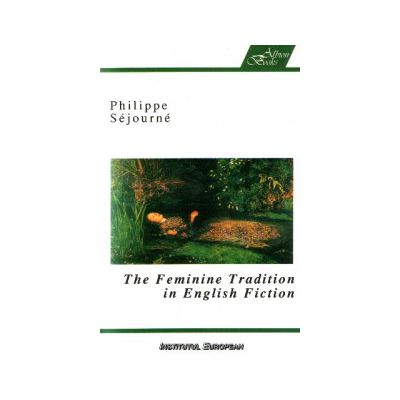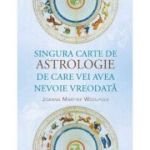THE FEMININE TRADITION IN ENGLISH FICTION

Preț: 21,00 lei
Disponibilitate: stoc indisponibil
Autor: Philippe SEJOURNE
ISBN: 973-611-030-3
Editura: Institutul European
Anul publicării: 1999
Pagini: 275
Format: 54x84
DESCRIERE
THE FEMININE TRADITION IN ENGLISH FICTION
Is there a feminine novel and, if there is, how would you define it? This question was put to me several years ago and it has preoccupied me ever since. This book is the result of some personal reflections and many discussions with my students. It does not pretend to give the complete answer but we hope that some light will be thrown on the subject in the course of the analysis of various novels written by ladies during the first hundred years (and more!) of feminine enterprises in the fields of literature. Women also wrote sentimental poetry and sentimental comedies, the latter being very close to many novels in inspiration. But, by and large, they struck their most frequent and forceful notes in fiction and this is the main reason for the undertaking of this work. As will appear at greater length in the first chapter, this was true from the very beginnings of the novel in England, if we accept the theory that 1740 was the starting-point. It was even true before, when the novel was still a tottering child, unsure of what its life would turn out to be. In 1820, Walter Scott still considered that "it would be impossible to match against the names of d'Arblay, Edgeworth, Miss Austen, Radcliffe, etc... the same number of masculine competitors;" and decades later George Eliot could claim that "a cluster of great names, both living and dead, rush to our memories, in evidence that women can produce novels not only fine, but among the very finest."Through all these years, not only had women written hundreds of novels, but they had, from the start, provided a large percentage of the readers. Eighteenth century English critics asserted that "works of this kind" were "chiefly calculated for the use and amusement of the ladies;" the Goncourts made the same remark in La Femme Française au dix-huitičme sičcle. There will be little change through the whole period we are concerned with, in spite of occasional moral objections. Does it follow that the novel is, by nature, a feminine genre?
If, for the individual, the great fascination for growing older means becoming progressively more aware of his human condition, this must be equally true of the life of a literary genre, as it grows from one generation to the next. L'art ne réside en aucun cas dans la lettre du conte enfantin, mais toujours entre les lignes, dans cette frange de significations irrécouvrables oů se forme sűrement son sens, et peut-ętre le seul secret de sa beauté. Marthe Robert Roman des Origines et Origines du Roman
Is there a feminine novel and, if there is, how would you define it? This question was put to me several years ago and it has preoccupied me ever since. This book is the result of some personal reflections and many discussions with my students. It does not pretend to give the complete answer but we hope that some light will be thrown on the subject in the course of the analysis of various novels written by ladies during the first hundred years (and more!) of feminine enterprises in the fields of literature. Women also wrote sentimental poetry and sentimental comedies, the latter being very close to many novels in inspiration. But, by and large, they struck their most frequent and forceful notes in fiction and this is the main reason for the undertaking of this work. As will appear at greater length in the first chapter, this was true from the very beginnings of the novel in England, if we accept the theory that 1740 was the starting-point. It was even true before, when the novel was still a tottering child, unsure of what its life would turn out to be. In 1820, Walter Scott still considered that "it would be impossible to match against the names of d'Arblay, Edgeworth, Miss Austen, Radcliffe, etc... the same number of masculine competitors;" and decades later George Eliot could claim that "a cluster of great names, both living and dead, rush to our memories, in evidence that women can produce novels not only fine, but among the very finest."Through all these years, not only had women written hundreds of novels, but they had, from the start, provided a large percentage of the readers. Eighteenth century English critics asserted that "works of this kind" were "chiefly calculated for the use and amusement of the ladies;" the Goncourts made the same remark in La Femme Française au dix-huitičme sičcle. There will be little change through the whole period we are concerned with, in spite of occasional moral objections. Does it follow that the novel is, by nature, a feminine genre?
If, for the individual, the great fascination for growing older means becoming progressively more aware of his human condition, this must be equally true of the life of a literary genre, as it grows from one generation to the next. L'art ne réside en aucun cas dans la lettre du conte enfantin, mais toujours entre les lignes, dans cette frange de significations irrécouvrables oů se forme sűrement son sens, et peut-ętre le seul secret de sa beauté. Marthe Robert Roman des Origines et Origines du Roman
Accesul clienţilor
-Promoţii
-- 118,80 leiPRP: 132,00 lei
- 47,20 leiPRP: 59,00 lei
- 42,75 leiPRP: 45,00 lei





RECENZII